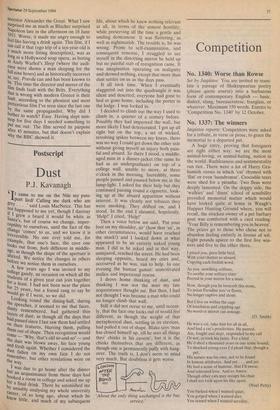Postscript
Dust
P.J. Kavanagh
It came to me on the Nile my pass- Port lied/ Calling me dark who am grey . . . .' said Louis MacNeice. This has l happened to me yet, though I daresay tf I grew a beard it would be white as Santa's, but of course we change, imper-
ceptibly to ourselves, until the fact of it change 'comes' to us, and we know It is
irreversible. No one ever told me, for example, that one's face, the cave one looks out from, feels different in middle- age, as though the shape of the aperture is altered. We notice the changes in others before we notice them in ourselves.
A few years ago I was invited to my college gaudy, an occasion on which all the students of a given year can join together for a feast. I had not been near the place for 25 years, but a friend rang to say he would go if I went, so we did.
Looking round the dining-hall, during the speeches, it seemed to me that faces, dimly remembered, had gathered thin layers of dust; as though all the days that had passed since I last saw them had settled on their features, blurring them, pulling them out of shape. Then recognition would come — 'Why, that's old so-and-so' — and the dust was blown away, his face young and fresh again. Whether I considered the dust fallen on my own face I do not remember, but other revelations were on the Way.
I was due to go home after the dinner but an acquaintance from those days had booked a room in college and asked me up for a final drink. There he astonished me by amiably analysing my whole university career, of so long ago, about which he knew little, and much of my subsequent life, about which he knew nothing relevant at all, in terms of the utmost hostility, while preserving all the time a gentle and smiling demeanour. It was flattering, as well as nightmarish. The trouble is, he was wrong. Prone to self-examination, and consequent remorse, I struggled to see myself in the distorting mirror he held up but no painful stab of recognition came. It was imagination operating on malignity and showed nothing, except that more than dust settles on us as the days pass.
It all took time. When I eventually staggered out into the quadrangle it was silent and deserted; everyone had gone to bed or gone home, including the porter in the lodge. I was locked in.
I decided to climb out the way I used to climb in, a quarter of a century before. Possibly they had improved the wall, but more likely I had deteriorated. I got up all right but on the top, a set of wicked, revolving spikes between my knees, there was no way I could get down the other side without giving myself an injury both pain- ful and absurd. So there I stood, a middle- aged man in a dinner-jacket (the same he had as an undergraduate) on top of a college wall, unable to move, at three o'clock in the morning. Incredibly, some people passed and paused below me in the lamp-light. I asked for their help but they continued passing round a cigarette, look- ing up at the absurd apparition without interest. It was clearly not tobacco they were smoking. They drifted on, and I stood. In the end I shouted, hopelessly. `Help!' I cried, 'Help!'
Then a voice below me said, Put your foot on my shoulder, sir' (how that 'sir', in other circumstances, would have reached the mark!) and I looked down at what appeared to be an entirely naked young man. I did as he asked and in that way, uninjured, reached the street. He had been sleeping opposite, heard my cries and, accoutred as he was, run to help. In one evening the human gamut: unmotivated malice and impersonal rescue.
I drove home thinking of dust, and thinking I was not the man my late acquaintance thought me. But then, I had not thought I was become a man who could no longer climb that wall.
Still it did not occur to me, until recent- ly, that the face one looks out of would feel different, as though the weight of that metaphorical dust, settling in its crevices,
had pulled it out of shape. Blake says 'man has closed himself up, till he sees all things thro' chinks in his ,cavern', but it is the chinks themselves that are different, as though one is permanently puffy with hang- over. The truth is, I don't seem to mind very much. But doubtless it gets worse.
'About the only thing unchanged is the bus service.'














































 Previous page
Previous page